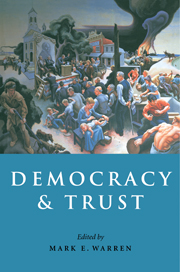Book contents
- Frontmatter
- Contents
- List of figures
- List of tables
- List of contributors
- Acknowledgments
- 1 Introduction
- 2 Do we want trust in government?
- 3 How can we trust our fellow citizens?
- 4 Trust, well-being and democracy
- 5 Democracy and social capital
- 6 Liberty against the democratic state: on the historical and contemporary sources of American distrust
- 7 Trust, voluntary association and workable democracy: the contemporary American discourse of civil society
- 8 Trust and its surrogates: psychological foundations of political process
- 9 Geographies of trust, geographies of hierarchy
- 10 Altruistic trust
- 11 Democratic theory and trust
- 12 Conclusion
- Index
6 - Liberty against the democratic state: on the historical and contemporary sources of American distrust
Published online by Cambridge University Press: 15 March 2010
- Frontmatter
- Contents
- List of figures
- List of tables
- List of contributors
- Acknowledgments
- 1 Introduction
- 2 Do we want trust in government?
- 3 How can we trust our fellow citizens?
- 4 Trust, well-being and democracy
- 5 Democracy and social capital
- 6 Liberty against the democratic state: on the historical and contemporary sources of American distrust
- 7 Trust, voluntary association and workable democracy: the contemporary American discourse of civil society
- 8 Trust and its surrogates: psychological foundations of political process
- 9 Geographies of trust, geographies of hierarchy
- 10 Altruistic trust
- 11 Democratic theory and trust
- 12 Conclusion
- Index
Summary
As he contemplates his choices, Dole has been getting shriller, reducing some arguments to buzz words and phrases that sound like they've been culled from market-research groups, and repeating them over and over. “The bottom line is trust,” Dole shouted at the Fairfeld County Fair Thursday night. “Who do you trust? Who do you trust? Who do you trust? Who do you trust? Who do you trust? Who do you trust? Who do you trust?” … Dole's top economic issue, a 15 percent tax cut, has been similarly distilled. “We believe that the federal government is too big, and it spends too much of your money, your money, your money,” the candidate says.(Report on the Dole campaign in The Boston Globe, October 12, 1996)
Introduction
It is now common knowledge among political scientists and commentators that America currently faces what Robert Putnam recently called a crisis of “civic engagement.” On nearly all indicators of political involvement, it has been found that citizens are either not participating or doing so in alarmingly declining percentages.
“By almost every measure,” Putnam (1995a) writes, “Americans' direct engagement in politics and government has fallen steadily over the last generation despite the fact that average levels of education – the best predictor of political participation – have risen sharply throughout this period.” This decline, he further argues, is part of a broader erosion of “social capital” in which “virtually all segments of society have been affected by this lessening of social connectedness, and this trend, in turn, is strongly correlated with declining social trust.”
- Type
- Chapter
- Information
- Democracy and Trust , pp. 151 - 207Publisher: Cambridge University PressPrint publication year: 1999
- 58
- Cited by

